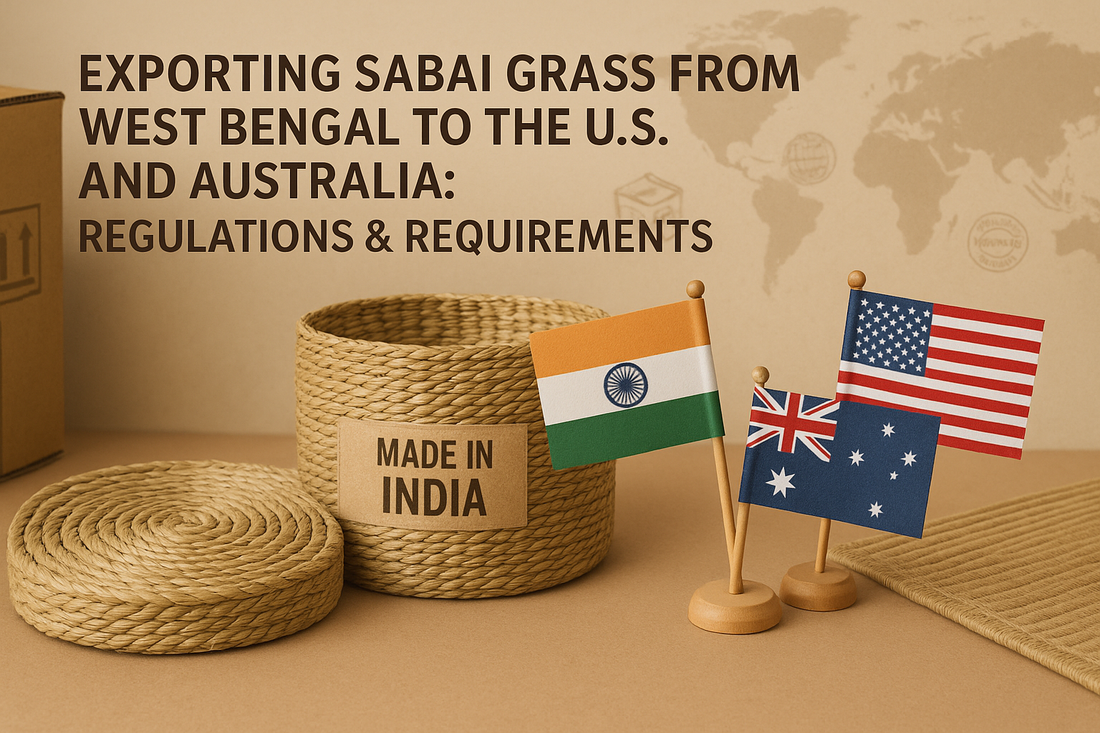
Exporting Sabai Grass from West Bengal to the U.S. and Australia: Regulations & Requirements
Share
Sabai grass
Known for its beautiful natural texture and sustainable appeal, is woven into baskets, mats, and bags that people love around the world. For artisan brands in India, exporting these handcrafted pieces can open exciting global markets.

If you’re based in West Bengal (or anywhere in India) and want to export Sabai grass products—whether raw material or finished baskets—to the U.S. or Australia, here’s a simple guide to get you started.
Step 1: Register as an Exporter in India
Before you can ship internationally, you’ll need to officially become an exporter.
Business Registration:
-
- Register your business as a sole proprietor, partnership, LLP, or company.
- Get a PAN and GST number. Even though exports are zero-rated under GST, you need GST registration to claim refunds on input taxes.
Import Export Code (IEC):
-
- A must-have for all exporters from India.
- It’s a 10-digit code issued by the Directorate General of Foreign Trade (DGFT).
- Apply online on the DGFT portal for ₹500.
- You’ll need your PAN, bank details, ID/address proof, email, and mobile number.
- IEC must be updated annually online between April–June.
Optional but Useful:
-
- Register with the Export Promotion Council for Handicrafts (EPCH).
- This helps you access trade fairs, market data, and export incentives.
Step 2: Essential Export Documents
Every export shipment needs clear documentation. Here’s what you’ll prepare:
- Commercial Invoice & Packing List
- Shipping Bill (filed with Indian Customs)
- Bill of Lading (for sea) or Air Waybill (for air)
- IEC Number on all documents
- Insurance Certificate (strongly recommended)
- Bank Documents (if payment is by LC or other formal methods)
Step 3: Special Certificates for Sabai Grass Exports
Because Sabai grass is a natural fiber, it needs extra care to meet import rules:
Phytosanitary Certificate:
-
- Mandatory for raw Sabai grass.
- Strongly recommended for finished products (like baskets and mats).
- Confirms your goods are pest-free and inspected by India’s Plant Quarantine authorities.
Fumigation Certificate:
-
- Often needed for Australia.
- Confirms treatment to kill pests.
Certificate of Origin (COO):
-
- Needed to get 0% duty under the India–Australia ECTA agreement.
- Optional for U.S. exports (but some buyers may request it).
Step 4: Clean, Treat, and Pack Your Products
Natural fiber goods face strict inspection abroad.
- Make sure all items are clean, dry, and pest-free.
- Remove soil, seeds, or insects.
- Fumigate before shipping if required.
- Use sturdy, moisture-resistant inner packaging.
- Avoid straw or hay as cushioning—use paper or foam instead.
- For wooden pallets or crates, ensure they are ISPM-15 certified (heat-treated or fumigated with the official stamp).
- Clearly mark products “Made in India”.
Step 5: Shipping Options – Small vs. Large Orders
Small Orders (Courier):
-
- Use DHL, FedEx, or India Post EMS.
- IEC still required for sales shipments.
- Faster customs clearance with less paperwork.
- But phytosanitary rules still apply.
Commercial Scale (Freight):
-
- Full shipping bill process with Indian Customs.
- Ideal for bulk orders to wholesalers or retailers.
- Sea or air freight via freight forwarder.
Exporting to the United States

Import Duty:
-
- Usually 0% for Sabai grass products (raw or baskets).
- No import VAT.
- Under $800 per shipment often clears duty-free under the de minimis rule.
Phytosanitary Rules:
-
- No import permit needed if items are fully dried and pest-free.
- Inspection on arrival by USDA/APHIS.
- Phyto Certificate recommended to speed clearance.
Lacey Act:
-
- Importer must declare the plant’s scientific name (Eulaliopsis binata).
- Be ready to share details if your buyer asks.
Labeling:
-
- All products must say “Made in India”.
- Wooden packaging must be ISPM-15 compliant.
Exporting to Australia

Important Link (Importing plants and plant products)- https://www.agriculture.gov.
Import Duty:
-
- 0% under India–Australia ECTA with a valid COO.
- Otherwise, usually 5% (but often waived for handicrafts).
GST:
-
- 10% on imports, paid by the Australian importer.
Biosecurity:
-
- Extremely strict.
- Phytosanitary Certificate almost always required.
- Fumigation strongly recommended.
- Goods must be 100% clean—no soil, seeds, insects.
- Packing Declaration often needed for sea freight.
ISPM-15:
-
- Wooden packaging must be treated and stamped.
Ports:
-
- Sydney, Melbourne, Brisbane—best equipped for inspections.
Pro Tip for New Exporters
✨ Start small with courier shipments to test the market and learn the process.
✨ Scale up to freight shipping as orders grow.
✨ Always talk to your freight forwarder or customs broker to stay updated.
Final Note
This is a simplified guide based on available information. Always double-check current rules with your freight agent, customs broker, or official government sources before shipping.
References & Useful Links
-
https://en.
wikipedia.org/wiki/ Eulaliopsis_binata - DGFT – Apply for IEC (ANF 2A Form):
https://content.dgft.gov.in/Website/ANF-2A_0.pdf - eBay Export Guide – IEC Code for Indian Sellers:
https://export.ebay.com/in/iec/ - ExportAgent – IEC Code Registration Process:
https://www.exportagent.in/post/iec-code-registration-process-fees-and-documents-required-1 - IndiaFilings – Revised IEC Application Fee:
https://www.indiafilings.com/learn/revised-application-fee-for-iec-and-various-dgft-services/ - USDA APHIS – Plant & Plant Product Imports:
https://www.aphis.usda.gov/plant-imports - NCBFAA – APHIS FAQs for Importers:
https://www.ncbfaa.org/membership-benefits/aphis-toolkit/aphis-faqs - APHIS – What Plant Material Requires a Permit?
https://www.aphis.usda.gov/plant-imports/what-plant-material-requires-permit - CBP – Importing Plants and Plant Products Help:
https://www.help.cbp.gov/s/article/Article-1194?language=en_US - Australia BICON – Conditions for Permitted Plant Fibre Articles:
https://bicon.agriculture.gov.au/BiconWeb4.0/ImportConditions/Search - Australia–India ECTA – Rules of Origin:
https://www.dfat.gov.au/trade/agreements/in-force/australia-india-ecta/australia-india-ecta-official-text/chapter-4-rules-origin - Australian Border Force – India FTA & COO Requirements:
https://www.abf.gov.au/importing-exporting-and-manufacturing/fta/free-trade-agreements/india - Magellan Logistics – Import from India: No-Nonsense Guide:
https://www.magellanlogistics.com.au/import-from-india-no-nonsense-guide/
